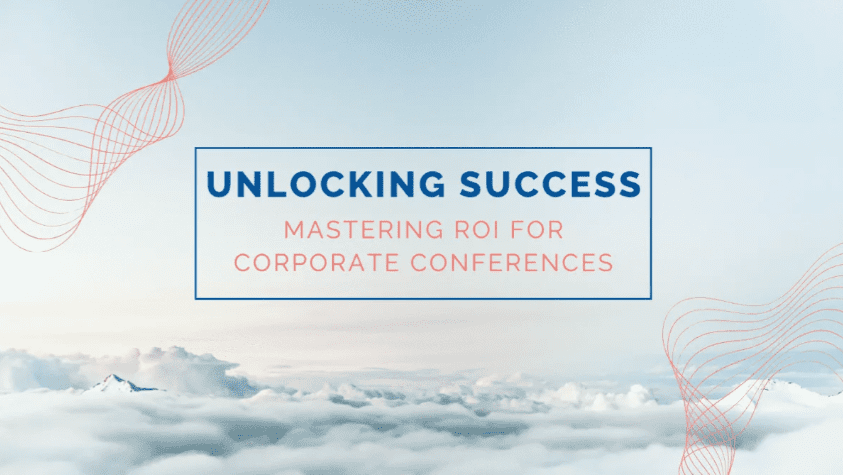
Unlocking Success: Mastering ROI Strategies for Corporate Conferences
Mastering return on investment (ROI) with corporate conferences involves more than just organizing an event; it requires a comprehensive approach that begins with meticulous planning, continues through strategic execution, and culminates in the thorough measurement of outcomes.
Here’s an expanded exploration of each component:
Meticulous Planning

- Objective Setting: Clearly define the objectives of the conference. Is it to generate leads, foster networking, educate participants, launch a product, or something else?
- Audience Analysis: Understand the demographics, interests, and preferences of the target audience to tailor the conference content and experience accordingly.
- Budgeting: Allocate resources wisely by forecasting expenses accurately and identifying potential revenue streams such as sponsorships or ticket sales (need a budget?)
- Venue and Logistics (site selection): Select a venue that aligns with the event’s purpose and audience size. Pay attention to logistics like accommodations, transportation, catering, and technology requirements.
- Content Creation: Develop a compelling agenda with relevant topics, engaging speakers, interactive sessions, and opportunities for audience participation.
- Marketing and Promotion: Implement a multi-channel marketing strategy to reach the target audience effectively. Utilize email campaigns, social media, PR efforts, and partnerships to maximize visibility and attendance.
Strategic Execution

- Engagement Tactics: Encourage attendee engagement through networking activities, Q&A sessions, workshops, and interactive exhibits.
- Speaker Preparation: Ensure speakers are well-prepared, knowledgeable, and capable of delivering engaging presentations that align with the conference objectives.
- Technology Integration: Leverage technology to enhance the conference experience, whether through event apps, live streaming, virtual reality experiences, or audience polling tools. (need help with audio visual?)
- Sponsorship Activation: Work closely with sponsors to maximize their visibility and ROI through branded signage, speaking opportunities, and tailored networking events.
- On-Site Professional Management: Have a dedicated team in place to oversee logistics, handle any issues that arise, and ensure a seamless experience for attendees. Not sure what staff to have onsite? Learn about the types of staffing.
Thorough Measurement of Outcomes

- Data Collection: Gather data throughout the conference, including attendance numbers, session evaluations, social media mentions, food and beverage intake, and lead generation metrics.
- ROI Analysis: Calculate the financial return on investment by comparing the conference’s revenue (ticket sales, sponsorships, etc.) to its expenses.
- Qualitative Feedback: Solicit feedback from attendees, speakers, and sponsors to gauge satisfaction levels, identify areas for improvement, and gather testimonials for future marketing efforts.
- Long-Term Impact: Assess the conference’s broader impact on brand awareness, industry influence, and relationships with key stakeholders.
- Yearly Improvement: Use insights from the evaluation process to refine future conference planning and execution strategies, ensuring continuous improvement and greater ROI over time.
By approaching corporate conferences with a focus on meticulous planning, strategic execution, and thorough measurement of outcomes, organizations can optimize their investment and maximize the value derived from these important events.
